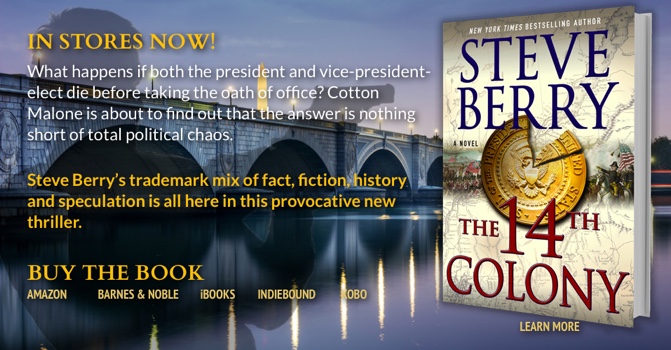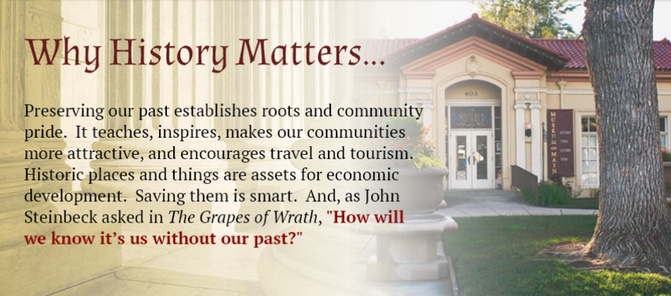He Writes Fiction Bestsellers. He Always Builds His Stories Around History. Why?
From a discussion between President Ronald Reagan and Pope John Paul II to American invasion plans of Canada created during the Second World War, author Steve Berry’s newest book, The 14th Colony, covers an incredible distance of history in a thrilling narrative.
We wanted to know why he always includes history in his works of fiction, so we asked him.
How long have you been writing historical thrillers and where did your passion for history start?
My first novel, The Amber Room, was published in 2003. There have been 14 since, all with action, history, secrets and conspiracies. I like to take something from the past, something real, something a bit obscure, and fashion a modern day thriller around it, keeping things about 90% accurate to history.
What inspired you to write The 14th Colony? Was there any historical research that struck you as particularly interesting or pertinent to the world today?
The inspiration came from something that happened on June 7, 1982. Safe inside the Vatican behind closed doors, for the first time in history a pope and a president met alone. To this day no one knows what they talked about for 50 minutes. No agenda existed, no recording was made, no notes taken. Historians are convinced that a deal was made, a tacit agreement of cooperation, both men having survived an assassin’s bullet, both men sharing a common goal: the end of communism. Whether that indeed happened we will never know. What we do know is that over the next six years Ronald Reagan and John Paul II, working independently of one another, brought the Soviet Union to its knees. And from that was born The 14th Colony.
You say your inspiration for this story came from the discussion between the Pope and President Reagan. But the story covers an incredible distance of history, as well as parts of lesser known history like the plans to invade Canada. How were you able to weave this narrative together using such a wide variety of historical facts? Were you always interested in covering the topic of the United States' plans to invade Canada?
I like to have divergent points from history in every novel. This one offered a merger of the Cold War, the War of 1812, and the possible invasion of Canada during the 1930s (which is real). My niche in the international suspense genre is to take these differing aspects and form them into a coherent story. As for the invasion of Canada, I came across that in the research for another book a few years ago and realized immediately it would make for good thriller. I think the reader will be surprised by America’s obsession with its neighbor to the north.
It’s interesting you found the information on Canada while working on another piece. As a writer it’s amazing how useful research can be even when it does not immediately apply to what we are working on. Is there any advice you would tell other writers?
Never write what you know. Bad advice. Instead, write what you love. I was a trial lawyer for 30 years. I knew that subject well. But I loved action, history, secrets, and conspiracies, so that’s what I wrote.
What are some areas of history you would like to write about in the future? Are there any topics you are currently researching?
There are lots of areas that interest me, which I plan to explore. Unfortunately, I have to keep those to myself so no one else will beat me to them.
Historic preservation is the focus of your philanthropic group History Matters. What historic sites does your group help to preserve?
There have been a variety of things we’ve helped, all across the country. Here are a few examples: the P.T. Barnum Museum in Bridgeport, Connecticut; the Lincoln Log Cabin in Charleston, Illinois; historic cemeteries in Raleigh, North Carolina, Atlanta, Georgia, and Jekyll Island, Georgia; the Mark Twain House in Hartford, Connecticut; museums in Seattle, Washington and Pleasanton, California; historic buildings in Beaufort, South Carolina and Berryville, Arkansas; and the rare book collection for the Library of Virginia and the Smithsonian Libraries. You can check out a full list on my website, steveberry.org under History Matters.
Why do you think historical preservation is especially important in the modern world?
Historic preservation establishes roots and community pride. It teaches, inspires, makes our cities and towns more attractive, and encourages travel and tourism. It literally creates assets perfect for economic development. Saving our history is not only important, it’s smart. Like John Steinbeck wrote, How will we know it’s us without our past?
How can people get involved in preserving historic sites with your group?
Any community out there that has something that may need preserving can contact us through my website and we’ll see if we can help out.
Historic preservation is the focus of your philanthropic group History Matters. What historic sites does your group help to preserve?
There have been a variety of things we’ve helped, all across the country. Here are a few examples: the P.T. Barnum Museum in Bridgeport, Connecticut; the Lincoln Log Cabin in Charleston, Illinois; historic cemeteries in Raleigh, North Carolina, Atlanta, Georgia, and Jekyll Island, Georgia; the Mark Twain House in Hartford, Connecticut; museums in Seattle, Washington and Pleasanton, California; historic buildings in Beaufort, South Carolina and Berryville, Arkansas; and the rare book collection for the Library of Virginia and the Smithsonian Libraries. You can check out a full list on my website, steveberry.org under History Matters.
Why do you think historical preservation is especially important in the modern world?
Historic preservation establishes roots and community pride. It teaches, inspires, makes our cities and towns more attractive, and encourages travel and tourism. It literally creates assets perfect for economic development. Saving our history is not only important, it’s smart. Like John Steinbeck wrote, How will we know it’s us without our past?
How can people get involved in preserving historic sites with your group?
Any community out there that has something that may need preserving can contact us through my website and we’ll see if we can help out.

